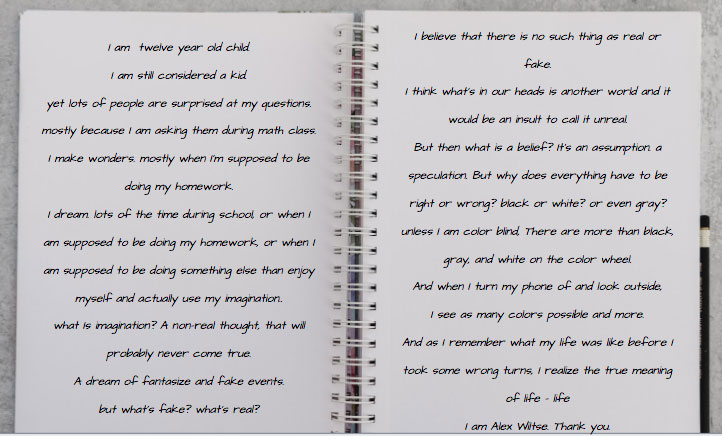All Districts — Devin Irish and Alexander Wiltse both admit they thought poetry was pretty much rhyming and, well, not really something they would find too interesting.
But the pair of North Park Montessori seventh-graders say they are enjoying learning about the craft — and themselves — through downloaded teaching materials provided free by The Diatribe. The Grand Rapids-based nonprofit uses spoken word, creative writing and performance poetry to promote discussion about equity and inclusion.

“It’s definitely at least more interesting than math,” joked Alex.
Added Devin: “I feel like it’s given me more of an outlet to write down things more.”
The 10-session course for middle school students, titled “Virtual Poetry Empowered: Mental Health and Wellness,” was released late last year. Through poetry videos, interactive student journals and writing prompts, the lessons help young people share their experiences and tell their stories.
Devin has used the opportunity to share her experience with, and feelings about, having dyslexia. And Alex, who is in the midst of writing a fantasy/history book, said he used third-person perspective to put thoughts about imagination, reality and life into words.
North Park Montessori English language arts teacher Jennifer Hall said her 37 virtual seventh-graders have been “blown away” by the lessons. Many include performed pieces such as this one by Rudy Francisco, or this one by Fable the Poet (also known as Diatribe Executive Director Marcel Price).
The emotions shared are honest, personal and, as Hall explains it, can be “exciting but squirmy” for middle schoolers: “I tell them this is a check-in. That kind of brought some of (their anxiety) down and in. It’s not as neat and as comfortable as I am used to, but it’s coming. Each session is so valuable.”

Empowered Through Writing
The content of each session is rooted in mental health, and features candid videos of The Diatribe’s teaching artists responding to discussion questions about their lives and how they cope with mental illness and stress. The culturally responsible program is inclusive, accessible and meets social-emotional learning and ELA standards.
Sessions include “What’s normal?,” mental wellness and healing. There’s a section for educators to help navigate student sessions, and all provide examples, discussion and writing prompts that encourage introspection.
As explained in the overview for educators, after completing the program students will have written rough drafts of five poems and completed final drafts of at least two very polished poems, with the ability to give an engaging performance of one or both.
Additional goals include increased student empathy, confidence, social-emotional learning, community interest/involvement and communication and listening skills.
The Diatribe had always intended to create online materials, said Education Director Rachel Gleason, so those efforts went into high gear when in-person learning was halted in March because of the novel coronavirus.
“I threw myself into taking the content we already had and creating new content,” Gleason said. Input and resources came from mental health professionals and a team of area teachers, while funding came from Meijer and a grant from Michigan Humanities to cover videography and graphic design.
“(Feelings) are going to be coming up,” said Gleason about using the program materials. “It’s really important that follow-up and care are taking place. We know what we talk about can strike chords. Some of it can be emotional.
“What a lot of teachers have told us is students relate to and view us not as authority figures, (but) as artists (or) older peers, in a way,” Gleason added. “We wanted a presence in the lessons, so we’re responding to the discussion questions too. … While we are getting the poetic techniques in there, this is about giving them the confidence and the language to speak up for themselves.”
The free materials were announced on social media in November, and by early December had been downloaded nearly 40 times by middle- and high-school educators in West Michigan, North Carolina and Colorado. Mental health clinicians have also downloaded it to use with their clients.
“It’s been cool to see where it’s gone,” said Gleason. “I’m really trying to find out who’s using it and to get feedback.”

Building a Safe Community
The Diatribe currently is working to develop a course aimed at ninth- and tenth-graders, though Hall said she thinks the middle-school curriculum could also be used by those students.
Hall is in her ninth year teaching at the middle-school level. She sees The Diatribe’s lessons as powerful work, particularly for this age group.
“They are young adults finding their place in the world, and they are wrestling with their identity, their sexuality, the political reality we’re living in,” she said. “Anytime somebody gives them the opportunity to harvest their feelings and think about themselves more is helpful. They’ve got lots of feelings.”
What’s more, she said, students are able to build bonds with their peers through the course, even when they aren’t connecting face to face.
“When we have the opportunity to be together it’s easier in some ways to build that safe community: you know who your classmates are, you’ve seen them laugh and cry in the hallways. Now they are having to be brave without the face-to-face connections. But in a way it’s kind of nice they get to share who they are this way, to know there are others who feel the same way they do about things.”













